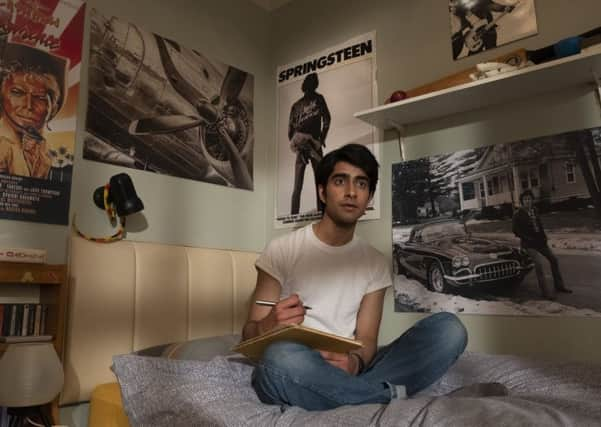Film reviews: Blinded by the Light | Transit | The Art of Racing in the Rain | Dora and the Lost City of Gold


Blinded by the Light (12A) ***
Transit (12A) ***
The Art of Racing in the Rain (PG) **
Dora and the Lost City of Gold (PG) ***
A coming-of-age fantasy about a British Pakistani teenager in 1980s Luton whose mind is blown by the music of Bruce Springsteen, Blinded by the Light sees director Gurinder Chadha get back to something like the form of Bend it Like Beckham with an amiable, big-hearted adaptation of journalist Sarfraz Manzoor’s Springsteen-inspired 2007 memoir Greetings from Bury Park. Fictionalising the transformative effect the Boss had on Manzoor’s life, the film – co-written by Manzoor, Chadha and Chadha’s regular co-writer Paul Mayeda Berges – revolves around Javeed (Viveik Kalra), a meek-seeming 16-year-old from a proud immigrant family whose discovery of Springsteen’s music encourages him to develop his own love of writing at a time when the world appears to be against him.
Springsteen’s remarkable ability to articulate the anxieties of the marginalised and the dispossessed in a way that crosses oceans and cultures is at the heart of the film as Javeed finds solace in his music from not just the all-consuming traumas of late adolescence (social ostracisation, girls, nobody understanding him), but also from his increasingly strained relationship with his father (who is himself facing redundancy from his factory job) and the racial hatred being dished out on a daily basis by the National Front.
Advertisement
Hide AdIf those sound like heavy subjects to conflate, the film makes a virtue of it by using the formulaic structure of a very broad crowd-pleaser to sneak in its still-relevant social commentary. That it doesn’t jar as much as you might think is down to Chadha and Manzoor’s understanding of the power of Springsteen, whose Born in the USA album is, after all, one of the great Trojan horse artistic works in American pop culture – a 30-million-selling album that sounds like a bombastic celebration of Reagan’s America but is really a poetic, radical howl from the heartland examining the disastrous legacy of Vietnam, the economic hardships of blue-collar life and the bitter pill of nostalgia.
Although Chadha’s film is ultimately too sentimental to do full justice to Springsteen’s work – plenty of which is featured on the soundtrack (he’s fully endorsed it) – she is good at conveying the way music can feel as if it’s speaking directly to you, visualising this idea by having Springsteen’s words explode from Javeed’s brain onto the sides of buildings as he listens to it for the first time. It’s not exactly subtle, but nor is the effect of hearing for the first time the thing that’s going to reshape your world in a profound way. Hayley Atwell (as an inspirational teacher) and Kulvinder Ghir (as Javeed’s father) offer solid support, but it’s the winning performance of Kalra, alongside Aaron Phagura as his fellow Springsteen devotee Roops, that make it such a joyous celebration of Springsteen’s music.
First published in 1944, the German Jewish novelist Anna Seghers’ novel Transit told a contemporary story of the Holocaust by detailing the efforts of an unnamed narrator to use an assumed identity to escape Nazi-occupied France before it was too late. In an effort to remain true to the spirit of the book – which was based partially on Seghers’ own experience of getting out of France in 1942 – German auteur Christian Petzold’s film adaptation strips away period details, immediately suggesting parallels with the contemporary rise of right wing extremism, which in turn gives the film a stark, look-how-easily-this-could-happen-again urgency. It’s a conceptually daring idea – the lack of specificity transforming its displaced protagonist, Georg’s (Franzo Rogowski) futile efforts to leave into a troubling, existential nightmare about the toxic air of paranoia that can’t help but accompany any forced exodus.
A golden retriever called Enzo recalls his life as the dog of an aspiring Formula One driver in the unintentionally bizarre The Art of Racing in the Rain. Voice-over narration from Kevin Costner articulates Enzo’s interior life as he gets to grips with his new master (Milo Ventimiglia) and philosophises about the various new family situations – marriage, babies, terminal illness, custody battles – they encounter together. It’s mawkish in the extreme – not helped by a lot of mystical chat about souls and reincarnation that brings back horrible memories of the similarly odd A Dog’s Purpose.
Directed by James Bobin (The Muppets), Dora and the Lost City of Gold finds the titular teenage adventurer – whom the world first encountered as a seven-year-old in the popular animated TV series Dora the Explorer – initially facing the vagaries of an American high school for her first live-action adventure. If this suggests a Mean Girls-style riff on Tomb Raider, the film soon gets back to the jungle as the relentlessly positive Dora and three outcast classmates are kidnapped by mercenaries in the hopes she’ll lead them to her explorer parents (Michael Peña and Eva Longoria) as they try to solve the mystery of a lost Inca civilisation. Bobin brings a welcome irreverence to the usual Indiana Jones-style booby trapped set-pieces, even finding a sly way
to pay tribute to the character’s cartoon origins. Newcomer Isabela Moner, meanwhile, is an endearing ball of energy in the lead – wacky songs and all. ■